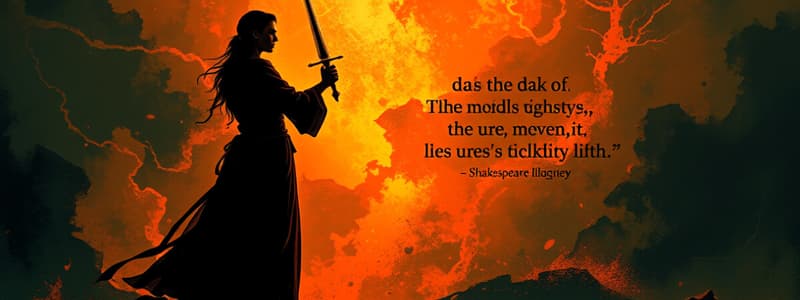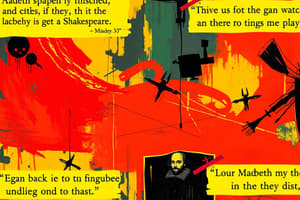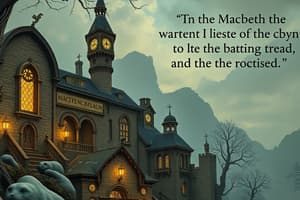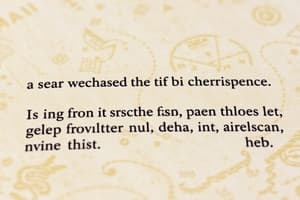Podcast
Questions and Answers
Who said, 'Fair is foul, and foul is fair'?
Who said, 'Fair is foul, and foul is fair'?
- Banquo
- The Witches (correct)
- Lady Macbeth
- Macbeth
What does Macbeth hope regarding his desires after Duncan's announcement?
What does Macbeth hope regarding his desires after Duncan's announcement?
He hopes his disappointment doesn't show.
What does Lady Macbeth fear about Macbeth's nature?
What does Lady Macbeth fear about Macbeth's nature?
She fears he is too kind.
What advice does Lady Macbeth give Macbeth about appearing innocent?
What advice does Lady Macbeth give Macbeth about appearing innocent?
What does Lady Macbeth request from the spirits?
What does Lady Macbeth request from the spirits?
What does Lady Macbeth mean by 'screw your courage to the sticking-place'?
What does Lady Macbeth mean by 'screw your courage to the sticking-place'?
What does Macbeth feel he must do after deciding to kill Duncan?
What does Macbeth feel he must do after deciding to kill Duncan?
Why does Lady Macbeth hesitate to kill Duncan herself?
Why does Lady Macbeth hesitate to kill Duncan herself?
What is Macbeth's reaction after killing Duncan?
What is Macbeth's reaction after killing Duncan?
What hallucination does Macbeth experience before killing Duncan?
What hallucination does Macbeth experience before killing Duncan?
What does Banquo express concern over regarding Macbeth's rise to power?
What does Banquo express concern over regarding Macbeth's rise to power?
Why does Macbeth list reasons against killing Duncan?
Why does Macbeth list reasons against killing Duncan?
What does Lady Macbeth say after killing Duncan about clearing their guilt?
What does Lady Macbeth say after killing Duncan about clearing their guilt?
Flashcards are hidden until you start studying
Study Notes
Key Themes and Quotes
-
Supernatural Influence
- "Fair is foul, and foul is fair." - Witches set an ominous tone, suggesting moral ambiguity and foreshadowing dark events.
-
Ambition and Desire
- "Let not light see my black and deep desires." - Macbeth’s internal conflict after Duncan names Malcolm as heir, showcasing his ambition to prevent Malcolm from ascending the throne.
-
Gender Roles and Power
- "Yet do I fear thy nature; it is too full of the milk of human kindness." - Lady Macbeth critiques Macbeth's kindness, fearing it will hinder their violent plans.
-
Deception
- "Look like the innocent flower, but be the serpent under't." - Lady Macbeth advises Macbeth to conceal his intentions, highlighting themes of appearance versus reality.
-
Quest for Cruelty
- "Come, you spirits... unsex me here..." - Lady Macbeth calls upon supernatural forces to strip her of femininity and fill her with malevolence to commit murder.
-
Courage and Determination
- "But screw your courage to the sticking-place, and we'll not fail." - Lady Macbeth motivates Macbeth, emphasizing the need for resolute courage before the murder.
-
Guilt and Identity
- "False face must hide what false heart doth know." - Macbeth reconciles with his decision to kill Duncan, recognizing the necessity of deceit in concealing his true feelings.
-
Parental Connection and Regret
- "Had he not resembled my father as he slept, I had done't." - Lady Macbeth reveals her hesitation to kill Duncan, indicating personal conflict stemming from familial likeness.
-
Consequences of Murder
- "What hands are here?... Will all great Neptune's ocean wash this blood clean from my hand?" - Macbeth's horror at his actions illustrates overwhelming guilt and the permanence of his crime.
-
Hallucinations and Inner Turmoil
- "Is this a dagger which I see before me, the handle toward my hand?" - Macbeth’s vision of the dagger symbolizes his descent into madness and moral decay before the murder.
-
Suspicion and Betrayal
- "Thou hast it now: King, Cawdor, Glamis... I fear thou play'dst most foully for't." - Banquo's suspicion of Macbeth’s means to power foreshadows the theme of betrayal.
-
Moral Dilemma
- "He's here in double trust..." - Macbeth lists his reasons against killing Duncan, revealing his understanding of moral obligations and the weight of betrayal.
-
Attempt to Avert Guilt
- "A little water clears us of this deed." - Lady Macbeth’s dismissive approach to their crime indicates her initial belief that guilt can be easily absolved, contrasting with Macbeth's deep remorse.
Studying That Suits You
Use AI to generate personalized quizzes and flashcards to suit your learning preferences.




